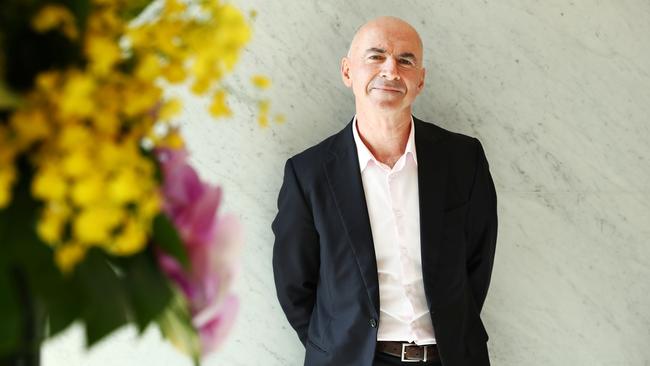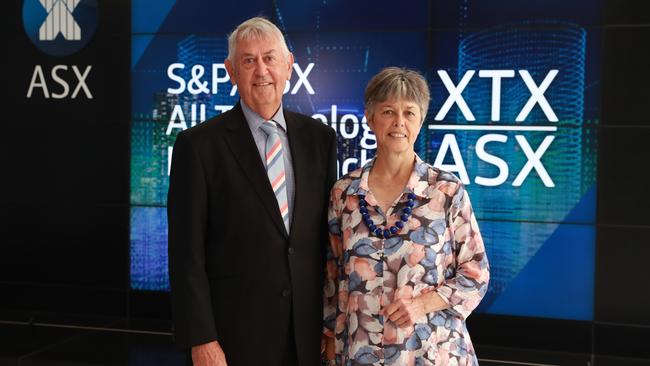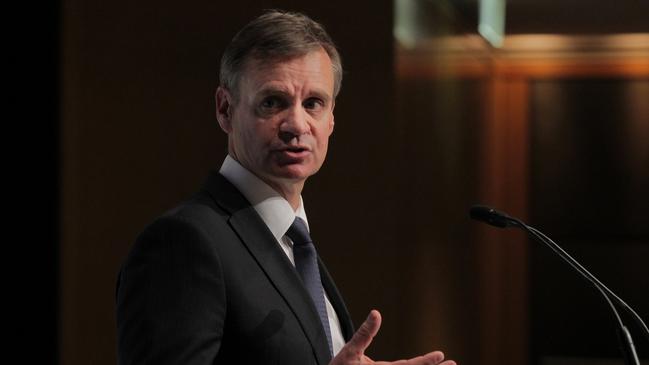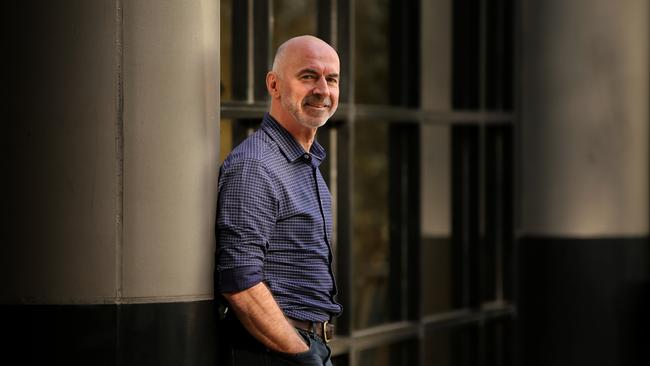From market darling to ASX also-ran: Appen CEO Mark Brayan on his turnaround task
Just a couple of years ago Appen was the ASX’s strongest performing stock. What happened?

Every day thousands of remote workers around the world log in to Appen’s online platform and are paid to perform tasks – from the mundane to the complex – generating the data used to power the largest of the tech giants: Amazon, Microsoft and Google.
But the Sydney-based company is facing an increasingly complex task of its own – turning around its flailing share price and convincing investors it still has room to grow. Appen’s share price is down 65 per cent in the past 12 months amid a broader tech sector rout. It is still bruised from a failed takeover in which its prospective suitor, Canadian telecoms outfit Telus, walked away without explanation from an offer that valued Appen at $1.2bn.
In 2018, Appen was one of the ASX’s hottest stocks. It was the best-performing company of the year – up 230 per cent in 12 months and some 2000 per cent since it had listed in January 2015 at 63c.
But it’s now a stock that equities analysts at Macquarie describe as their “least preferred” of the Australian technology stocks – connectivity provider Megaport is its most preferred – and Appen’s shares are at five-year lows, closing on Friday at $3.60, down from highs of $40 in 2020.
Ord Minnett has downgraded Appen’s shares to a sell rating, and slashed its price target to $3.00.
Appen chief executive Mark Brayan say he is acutely aware of the uphill battle he faces to turn the share price around but adds that he is sticking around for the challenge, and has a plan: ween his company off the tech giants.
“We want to grow beyond our top five customers,” Mr Brayan said in an interview. “We rely very heavily on the on the tech giants. Our customers like us to keep the work we do with them confidential, so we don’t name those companies, but nonetheless they’re the biggest tech companies in the world, and they comprise a very large share of our revenue.
“Now we’re investing heavily to grow beyond that, in places like China for example, which is going quite well. The tech giants are very important to us, and they’re huge consumers of what we do.
“But clearly, we need to have a broader customer base, and we’re working on that. This chapter for us is about growing beyond the tech giants.”
Appen’s business is made up of more than 1 million people who earn money by completing tasks like performing web searches and evaluating the quality of the responses, to more complex jobs like taking photos of all the electric vehicle charging stations across a city to help map their locations. It’s that data that has been valuable for the tech giants and powered Appen’s climb up the ASX 200, before it tumbled out in June.
“We can collect or work on data from any place at any time around the world,” Mr Brayan said.
Appen was founded in 1996 by Julie Vonwiller, a linguist at the University of Sydney, who started the company in her spare room. She was later joined by her husband, Chris Vonwiller, who left his job at Telstra in 2000 to join full-time. He served as the company’s chairman and the pair remain Appen’s biggest shareholders.
“Julie collected speech data and prepared it for customers, and the business grew quickly, there was a lot of demand,” Mr Brayan said. “The focus … was very much around speech and language data given Julie’s expertise, and what we know today as chatbots and virtual assistants, and the little things that pop up on websites that say ‘how can I help you’, they’re all driven by the sorts of technologies Appen was working on.”

In 2009, private equity firm Anacacia Capital took a majority stake in Appen, allowing its founders to have a staged retirement, and helping it expand overseas and hire rapidly. In 2011 Appen acquired the US-based Butler Hill Group, which provided linguistics services for Microsoft. Mr Brayan joined in July 2015 as chief executive, expanding the company’s reach and focus beyond natural language processing.
“From that 2015 to 2020 period the business grew very rapidly on the back of substantive trends like the growth in search, social media and online advertising, which all required a lot more data,” he said.
Its shares hit record highs in 2020, but the Covid-19 pandemic hit Appen particularly hard, Mr Brayan said, given the widespread drop in online advertising budgets, which then flowed through to a drop in demand for the company’s services. Big tech companies account for more than three-quarters of Appen’s revenue.
Appen executives were also blindsided by a change by tech giant Apple that restricted how much data third parties can glean off end users when they use apps and browse the web on their iPhones. The changes led to a steep drop-off in spend on advertising-based projects by Facebook and Google – who used the personalised data for targeted advertising and relevant searches.
Mr Brayan is confident those businesses will work out a solution and spending will pick back up.
“If you’re a business that relies heavily on online advertising, and there’s an upstream thing that impacts the ability for you to provide service to your customers, you’ve got to work around that somehow,” Mr Brayan said.
“In my conversations with the customers, I don’t know what their solutions are, but they’ve assured me they’re investing in working around the problem to provide a great service for their customers.”
Some shareholders remain critical of management, including Mr Brayan, for the plummet in value.
“When are you the management team including directors going to resign? You have destroyed shareholders’ investment,” one investor asked the company’s chairman Richard Freudenstein at Appen’s annual meeting in May, to which Mr Freudenstein said: “I believe we have a very, very strong executive team who are really ready to really drive this company forward over the next few years.”

Analysts meanwhile remain apprehensive. RBC Capital Markets’ Gary Sherriff said Appen’s major customers continue to face headwinds, cutting costs and re-prioritising spend, impacting Appen’s revenues. He’s maintained a $4 price target on the stock. Citi equities analyst Siraj Ahmed has a “sell” rating on Appen and a $4.40 price target.
Mr Brayan said aside from growing Appen’s customer base beyond the tech giants, the key to his company’s turnaround will be a digitisation of its processes, which he said currently are too manual. In the future, Appen’s ‘crowd’ will be checking and annotating work that has already been done by AI and machine learning, rather than having to do the bulk of the work themselves.
He said Appen is not aiming to reduce its number of crowd workers, instead increasing the volume of data they produce, and the speed at which they produce it. He said Appen’s crowd workers can ultimately be much more efficient than they are currently.
“Our ambition in life is to help our customers make AI work for everyone,” he said. “There are some really awful examples of AI, for example facial recognition doesn’t work for certain ethnicities and in certain countries. What we’re super passionate about is providing high-quality data to our customers so their AI platforms perform really well.”
The company recently announced a full review of its business. Mr Brayan said he didn’t want to pre-empt any findings but said he would remain in the chief executive role and was excited by Appen’s future.
“When you’re in a high-growth phase, the market rewards you, and when the growth slows down, at a time when there are, you know, other pressures on the sector, they compound to put the pressure on,” he said.
“We are reviewing all areas of the business in order to accelerate productivity improvements and margin expansion. We’re looking at every aspect of the business to improve those elements.”

He added that he remains open to another takeover bid should one eventuate.
“Our job on behalf of shareholders is to deliver value for their investments. And so anything that comes our way that potentially has value for investors, we‘re going to look at it and we’re obliged to do that,” he said.
“I do tend to focus my day-to-day energy on customers and staff. That’s kind of what I wake up to every morning. But clearly, if these things come along, we’re obliged to look at it and we’re obliged to act accordingly.
“But I’m excited about the market we’re in I’m excited about the journey. I think every CEO’s role comes with some headwinds; I’ve run the business for seven years now.
“We are certainly facing some headwinds at the moment but I’m reassured by our capabilities and the team I’ve got around me to sort of get through this.
“The company has to work through these things, and we‘re going to work through this.”






To join the conversation, please log in. Don't have an account? Register
Join the conversation, you are commenting as Logout